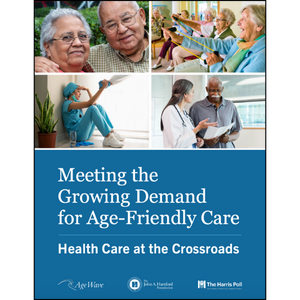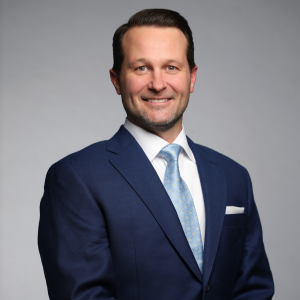New Report Reveals Need to Rethink Care for Aging Adults
As the senior care community prepares to meet the care needs for America’s booming senior population, a new report suggests that we may be going about it in the wrong way. The report reveals that older adults are largely dissatisfied with the health care and related services available, suggesting that the senior care and health industries may need to rethink the services they’re offering.
Report Reveals Significant Dissatisfaction with Available Services
 The report, Meeting the Growing Demand for Age-Friendly Care; Health Care at the Crossroads, was released by Age Wave and The John A. Hartford Foundation. Age Wave conducted the study on behalf of The John A. Hartford Foundation and in partnership with The Harris Poll. The survey was conducted from April 17 to May 9, 2024, encompassing 5,023 adult respondents, including 2,516 respondents age 65 or older.
The report, Meeting the Growing Demand for Age-Friendly Care; Health Care at the Crossroads, was released by Age Wave and The John A. Hartford Foundation. Age Wave conducted the study on behalf of The John A. Hartford Foundation and in partnership with The Harris Poll. The survey was conducted from April 17 to May 9, 2024, encompassing 5,023 adult respondents, including 2,516 respondents age 65 or older.
The report reveals that older adults are dissatisfied with the health care system. Just 11 percent of respondents would give the health care system an A grade. There is deep distrust of the health care system’s capabilities, with 82 percent of older adults saying that the health care system isn’t prepared for America’s aging population’s growing and changing needs.
With 95 percent of older adults wanting to age in place, worries about long-term care are common. The report found that 60 percent of respondents worry about receiving poor quality care and losing their independence, and 52 percent worry about being mistreated or disrespected. The loss of independence is a greater worry for older adults over 80.
Older adults largely lack trust in the overall motivations of the health care system. Health insurance and pharmaceutical companies are the least trusted members of the health care sector. 81 percent of adults of all ages agreed with the statement, “the health care system is more concerned with making money than providing good quality care.”
Additionally, two-thirds of older adults agree with the statement, “one of my greatest worries is not being able to afford future health and long-term care needs.” Large majorities of respondents agree that the government should prioritize lowering prescription drug costs and improving the affordability and quality of long-term care through Medicare coverage.
The study reveals a strong preference for age-friendly care, too. Older adults want their providers to understand, recognize, and respond to aging-related health issues, as well as to consider their personal situations. Just 19 percent of older adults with a regular health care provider report that their providers routinely cover physical fitness and mobility, cognitive functioning and mental health, medication management, and what matters to them in terms of health and well-being. Older adults who receive these age-friendly care essentials tend to have better relationships with their health care providers, view their quality of care more positively, and report good health.
When it comes to topics that older adults want their providers to discuss more, what matters to individuals regarding their health and well-being tops the list. Other top priorities including making sense of various tests that have been performed, and maintaining or improving mobility and physical fitness. Additionally, 49 percent of older adults want their providers to be partners, rather than making decisions and telling them what to do. When asked to identify the most important traits for a health care provider to have, being very knowledgeable and competent and listening to and respecting older adults ranked equally (67 percent).
Designing Services That Reflect Aging Adult Preferences
“Older adults are stuck in a health care system that is not responsive to their goals and preferences,” says Terry Fulmer, president of The John A. Hartford Foundation. “Boomers want health care that maximizes their health and ability to function, and they want their providers to listen to them.”
Fulmer notes that it’s absolutely possible to provide services that reflect aging adult priorities and preferences. “It is not too late to pivot to age-friendly care, which prioritizes the needs and desires of older adults in their care plan,” he says. “There are many innovative approaches to help older adults live every year to its fullest, not just increase the number of years they live.”
The report identifies five key recommendations to help improve older adult health care and promote healthier, happier aging:
- Promote age-friendly care that focuses on wellness and quality of life, rather than on treating diseases.
- Pursue scientific breakthroughs that could end diseases like Alzheimer’s.
- Address social isolation by supporting tools for empathetic and respectful mental health care and support.
- Assist family caregivers with skill-building tools, flexibility in taking paid leave, and ensuring care providers coordinate among multiple providers, making it easier to navigate care.
- Support a ‘national master plan for aging’ centered on older adult needs, identifying and addressing barriers that contribute to inequities. This specifically includes a plan to finance long-term care and nursing home reform, including systems that provide health care in people’s homes.
Providing Age-Friendly Care
The importance of age-friendly care arises multiple times in this report, and it’s clear that older adults highly value this care model. Age-friendly care is designed around what patients say matters to them: medication, mentation, and mobility. Through the Age-Friendly Health Systems Initiative, more hospitals, medical practices, nursing homes, and home-care providers are adopting and delivering age-friendly care. The John A. Hartford Foundation offers numerous age-friendly care resources, including a comprehensive book and numerous guides.
This report highlights several ways that current health care and senior care services fail to meet aging adults’ priorities and preferences. As aging adults identify concerns about health care and senior care services, now is the time for the senior care industry to make changes that address these priorities, such as offering age-friendly care. These changes can help aging adults feel seen and heard, allowing them to receive the care and services that they both want and need.

Paige Cerulli is a contributing writer to i Advance Senior Care.
Related Articles
Topics: Featured Articles , Leadership , Medicare/Medicaid











